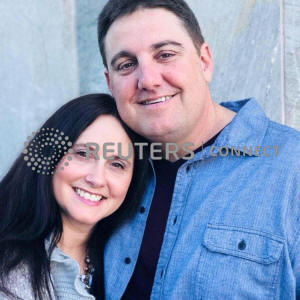|
Surge at U.S. border pushes some
evangelicals to help asylum seekers
 Send a link to a friend
Send a link to a friend
 [December 22, 2018]
By David Schwartz and Andrew Hay [December 22, 2018]
By David Schwartz and Andrew Hay
PHOENIX/TAOS, N.M. (Reuters) - Members of
an Arizona evangelical church are for the first time taking Central
American asylum seekers into their homes, responding to record arrivals
of migrant families at the U.S.-Mexico border.
The predominantly white Central Christian Church, a Phoenix area "megachurch"
had in the past assisted Muslim refugees. Church leaders wanted to help
another group that lacked support and were portrayed as a threat in
areas of the media and politics - asylum seekers.
Central Christian is among a group of around 10 churches, most of them
Hispanic, taking in up to 500 migrants a week from Immigration and
Customs Enforcement (ICE) in greater Phoenix.
The migrants, mostly families, have been released into the United States
to pursue their immigration cases in court. That flow could dwindle if
the Trump administration is successful in its plans to make non-Mexican
asylum seekers wait in Mexico while their claims are processed.
"It’s the first time we have been engaged with asylum seekers,” said
Matt Nutter, director of global outreach at Central Christian. "It’s an
issue of humanity, we look at this beyond the politics of it.”

'THEY'RE NOT CRIMINALS'
President Donald Trump has said many migrants who left their countries
for economic reasons are applying for asylum in the United States even
though they may not have legitimate claims for protection from
persecution.
Central Christian members Stephanie and Peter Apostol said they put
aside politics and labels put on asylum seekers to host six families in
the last two months. They ranged from a Mexican mother and infant to a
Guatemalan father and teenage son, with families staying up to three
nights.
The Apostols have received criticism and praise on social media for
giving shelter to asylees. They said their faith compelled them to show
compassion for this "vulnerable" group.
"These are just very wonderful people, they’re not criminals," said
Stephanie Apostol, 48, who has given away the family's luggage to help
asylum seekers travel on to relatives and other sponsors after staying
at their home in Chandler, a Phoenix suburb.
Her 9-year-old son gives up his bedroom if they host two families at
once. A Mexican-American neighbor translates for the Apostols, who only
speak a few words in Spanish.
"It's very easy to put yourself in their shoes when you're with them in
your home," said Apostol, a market research analyst. "What would we do
if we were facing hunger and violence and the safety of our kids?"
'NEVER SEEN THIS BEFORE'Illegal crossings at the southern border have
dropped dramatically since the late 1970s, but in recent years
applications for asylum have ballooned and more Central American
families and unaccompanied children are heading to the United States.
Facing high numbers of migrant families, and to avoid holding them
beyond legal time limits on how long children can be detained, ICE began
releasing large groups to Arizona charities and churches in October, ICE
spokeswoman Yasmeen O'Keefe said.
With Hispanic churches running out of beds, coordinator Magdalena
Schwartz reached out to dozens of churches in the Phoenix area. Two
Anglo-American churches stepped up, one of them Central Christian.
[to top of second column]
|

Asylum seeker host family Stephanie Apostol and Peter Apostol are
pictured in Chandler, Arizona, U.S. in this December 21, 2018
handout photo. Courtesy of Apostol Family/Handout via REUTERS

"They have opened their churches and homes, I've never seen this
before," Schwartz, pastor of evangelical church Nueva Esperanza in
Mesa, said of the Anglo congregations.
LAW AND ORDER
Using high school Spanish and Google Translate, Ericka Henry, 27,
and her husband Blake, 30, hosted two Guatemalan families at their
two-bedroom home in Phoenix suburb Mesa.
"We have more than enough, more than we need, so we try to help
people as much as we can,” said Blake, a pastor at Central
Christian.
The church's initiative is growing, with members of other
congregations asking to host families. But reactions to the program
have not all been positive.
When the Apostols spoke on a radio show in Phoenix, the capital of a
state that backed Trump in 2016, posts on social media said they
were endangering their children, breaking the law and helping
criminals by letting asylum seekers into their home. Others came to
their support, however.
"These folks that are housing asylees are, in some ways, I think
very brave, because they are swimming against the tide of public
opinion and trends in their own religious community," said Janelle
Wong, professor of American Studies at Maryland University and
author of "Immigrants, Evangelicals and Politics in an Era of
Demographic Change."
Polls show most white U.S. evangelicals back President Donald Trump
and his immigration policies, even though their churches often
support refugees and immigrants, said Ed Stetzer, a dean at Illinois
evangelical school Wheaton College.
A November poll by the Public Religion Research Institute found
white evangelicals were the only major religious group in the United
States in which a majority said immigrants represented a threat to
America's customs and values. (https://bit.ly/2qiRTlE)
Central Christian families declined to comment on their political
affiliations, but said they had a politically diverse congregation.
For the Henrys, hosting asylum seekers was a commitment to "love the
other," regardless of their politics, religion or race.

"Once you get a taste of it, then you realize that this is kind of
what being a human is about,” said Ericka, also a pastor at Central
Christian.
(Reporting by David Schwartz and Andrew Hay; editing by Dan Wallis,
Mica Rosenberg and Tom Brown)
[© 2018 Thomson Reuters. All rights
reserved.]
Copyright 2018 Reuters. All rights reserved. This material may not be published,
broadcast, rewritten or redistributed.
Thompson Reuters is solely responsible for this content. |